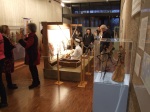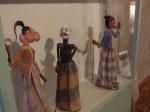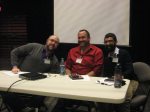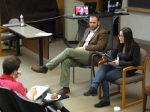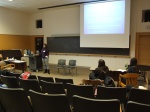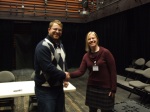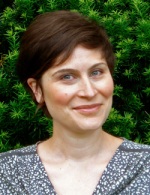Tag Archives: Practice as research
Photos from the 2014 Cultural Indigestion Conference
Everyone enjoyed the 2014 Art@IU Cultural Indigestion Conference. Papers, performances, and a roundtable were held to discuss the importance of intercultural theatre and performance practice. Here are a few pictures of the various events that made the conference successful!
- The conference starts with the opening of Still/Moving at the Mathers Museum of World Culture
- Patrons view the newly-opened Still/Moving exhibit
- Detail on Wayang Golek clown puppets
- Scholars enjoy our conference-opening dinner
- Detail on the Conference nametags and binder
- Josh, Joe and Mike present papers on musicals
- We had presenters skyping in to discuss prison theatre.
- Susannah presents her paper as Andres watches
- The roundtable was moderated by Sara and attended by faculty, grad students, and undergrads
- Jashandara presents on modern Indian theatre
- Sara, Jashandara, and Wei yu listen to questions after their panel.
- This panel featured two fantastic undergrads and a graduate student from the folklore department
- Dr. Goodlander awards the 2014 essay contest prize to Whit
- Keynote speaker Lucienne Guedes Fahrer listens to Sara tell a story from her past. Eric translates.
- Lucienne Guedes Fahrer
Dancers and Composers Collaborate in Practice-as-research Project
IU Contemporary Dance and the Jacobs School of Music’s Student Composer Association present their annual collaboration between student choreographers and composers:

Hammer and Nail
An evening of original student works performed by student dancers and musicians
Wednesday April 23-24 // Performances @ 6:30 pm & 8:30 pm
Buskirk-Chumley Theatre
114 E Kirkwood Ave, Bloomington, IN 47408
(812) 323-3020
Hammer and Nail is an evening of contemporary dance featuring collaborations between Indiana University student choreographers and composers. It is a lively, dynamic event featuring the artistry and virtuosity of contemporary dance majors and the world-class Jacobs School of Music students.
An opportunity to hear live, original, musical scores accompany contemporary dance, it has become a favorite springtime event and is in its ninth year. The 6:30 pm and 8:30 pm programs feature different collaborations.
The event is free, and cash or non-perishable food donations are collected to benefit Hoosier Hills Community Food Bank.
Picasso’s Women – A Peek Behind the Curtain
Senior BA Major Juliet Barrett has designed her Honors Thesis around Brian McAvera’s play about the lives of Picasso’s several wives and lovers. Check out her guest blog on 7th & Jordan to read more about her amazing research and rehearsal process:
In art there are no rules.
I consider myself equal parts director and actor. Had you asked the freshman Juliet, my outlook would have been drastically different. And now I look back and the journey has been nothing that I expected and everything that I wanted.
At the beginning of this year I wanted a capstone project that would combine all of the methods, styles, and life lessons from my undergrad career. This search ultimately lead to the creation of my senior Honors Thesis: producing and directing Picasso’s Women by Brian McAvera. I planned this project in order to challenge my own artistic process and to create a common ground for artists on campus who wouldn’t regularly have the opportunity to meet. A play of female monologues told from the perspective of the mistresses and wives who inspired the legacy of the great painter, Picasso’s Women provides a unique view…
View original post 167 more words
DEC 6-7: Join us for a 2 days of Bard-related Entertainment!
SHAKESPERIENCE: Embody
As a part of Themester 2013: Connectedness: Networks in a Complex World, join us foran Open House of Student Work and Performances with art, acting, dance, musical performances and FREE snacks!
Eric “C” Heaps Directs World Premiere of Lucienne Guedes Fahrer’s “Refusing the Flower” in His Own Translation
In November, second-year PhD student Eric “C” Heaps will be presenting the world premiere of Refusing the Flower (A recusa da flor) by Lucienne Guedes Fahrer, a playwright, director, actor, and theatre artist from São Paulo, Brazil.
In his director’s note, Eric shares his interest in both the playwright and her play, which he translated and directed:
“I first met Lucienne last year at an event titled Dramaturgia Concisa e Contemporânea (Concise and Contemporary Playwriting), where playwrights have 90 minutes to write a 5-10 minute scene which will be performed that night; Lucienne was the winner that night. The following week I attended her play Banda Hamlet, a rock show where the characters from Hamlet come back from the dead to retell their stories using popular music. I was hooked from that point. And since even award-winning contemporary playwrights from Brazil are unfortunately unknown in the United States, I decided to bring one of her plays to you.”
A founding member of Teatro da Vertigem (Vertigo Theatre), as well as a member of Cia. dos Dramaturgos (Company of Playwrights), Fahrer has been principal at the Free School of Theatre in Santo André and a resident-artist at the São Paulo School of Theatre. In addition to her career as a professional artist, she is now pursing a doctoral degree from the University of São Paulo.
It is an interesting turn of events that the first fully staged production of Refusing the Flower should be in English rather than Portuguese. The play’s translation and eventual production served as a practice as research project for Eric who plans to pursue translation theory in his dissertation next year. In part, Refusing the Flower’s American premiere asked questions key to Eric’s research about how meaning is transmitted when both actors and spectators are working in a language that they have no prior experience with:
“The history of translation is marked by a pendulum swing of public opinion regarding its validity as a practice. Romans translated and adapted Greek theatre, believing that by putting it into Latin they improved it. Later, early translations of the Bible into languages other than Latin brought people to the stake to be burned. But whatever the opinion towards translation’s viability, we often take translation for granted in the theatre world. Partially in order to combat this tendency, and also to demonstrate the validity of bilingualism in American theatre, for this production I’ve maintained some of the Portuguese in the script. By so doing, I hope to further various dramatic functions of the script and provide something more meaningful than would be provided by either language alone.”
Eric collaborated with Fahrer on on the final draft of his translation and plans to film the project in the hopes that the piece might continue to be developed both in the US and Brazil. The production features IU students and community members, most of whom are making their premiere on IU stages as well.
See Lucienne Guedes Fahrer’s Refusing the Flower, translated and directed by Eric “C” Heaps.
November 9-10 @ 7:30 pm; November 11 @ 12:00 noon
Studio Theatre
2nd Floor, Lee Norvell Theatre & Drama Center
275 N. Jordan Ave. | Bloomington, Indiana 47403
CAST
Lauren Sagendorph as Júlia
Keenan H. Crotty as Lúcio
Mary Emma Heaps as Young Girl/Mother/Echo/Band
Amanda Wenz as Enemy/Pregnant Woman/Band
Nick Pappas as Pregnant Woman’s Husband/Echo/Band
Clarence Knapp – Band
CREW
Director……………………….Eric “C” Heaps
Stage Manager………………..Jenna Johnson
Composer/Music Advisor……..Ben Taylor
Lighting Design……………….Justin Bennett
Costume Design………Mary Emma Heaps
Hair/Makeup……………………….Anna Ross
Additional music by Fito Paez
Prof. Alison Calhoun presents Practice as Research Performance of Scenes from Jean-Baptiste Lully with Jacobs School of Music
Lully: Glory without Love?
Scenes from the operas and comedy ballets of Jean-Baptiste Lully
Saturday, April 21, & Sunday, April 22, at 4:00 pm
Auer Hall (Located on the second floor of the Simon Music Center, 200 S. Jordan Ave.)

A rehearsal from Lully: Glory without Love?
A Co-production of IU Baroque Orchestra, Pro Arte Singers, IU Ballet Department, and the Early Music Institute
The delights of Jean-Baptiste Lully’s magical dances, airs, recitatives and triumphant marches will be on display in Auer Hall this weekend as the Early Music Institute, Jacobs School Ballet Department and Pro Arte Singers combine forces to present Lully: Glory Without Love?
With an original script by guest actor Mace Perlman, baroque choreography by guest stage director Catherine Turocy and music direction by Nigel North, the program weaves together scenes chosen from the most poignant moments in the composer’s operas and comedy-ballets Psyché, Alceste, Armide, Atys, Isis, Le Bourgeois Gentilhomme and Bellérophon.
For this production, the Early Music Institute has brought together two outside professionals to work with students on artistic expression specific to the French seventeenth century.

Catherine Turocy, leading choreographer, reconstructor, and stage director in 17th-18th century period performance. | Photo by Beatriz Schiller.
Choreographer and period movement expert Turocy, director of the New York Baroque Dance Company, has worked with ballet students and singers in the art of early French dance, gesture and pantomime. She has also provided a number of elaborate period costumes, which will be used by dancers during this production.
By weaving Lully’s music into one moving story about the impossible tension between love and glory, Perlman has created a staging for the production, with inspiration from the diverse masks of the commedia dell’arte. His collection of Venetian commedia masks will also be featured.
Lully, love and power are three key words that combine to create Lully: Glory Without Love? From the allegory of Glory herself to such diverse characters as Armida, Renaud, Fury and Italian and Spanish lovers; from suicidal scenes, dream scenes, triumphant marches and the wonders of Lully’s passacaille, this production will present what Perlman has called the “many eyes of Lully’s life and art.”
With talented student soloists, a full baroque orchestra, the choral strengths of the Pro Arte Singers, the masterful baroque choreography of Turocy and the commedia dell’arte-inspired staging of Perlman, audiences will be offered a unique and powerful experience that captures the essence of the French baroque.
Nigel North, Music Director
Stage Direction by Catherine Turocy and Mace Perlman
Choreography by Catherine Turocy
Spoken Narration by Mace Perlman
Production Concept, Alison Calhoun
Nigel North, music director
Mace Perlman, stage director and writer/text and language coach/actor
Catherine Turocy, stage director/choreographer/period movement coach
Alison Calhoun, production concept, French diction coach
Paul Elliott Director, Early Music Institute, vocal coach
William Jon Gray, Director, Pro Arte Singers
Juan Carlos Zamudio, Assistant Director, Pro Arte Singers
Sarah Edgar, assistant choreographer
Rachel Fernandez, stage manager
Alison Calhoun is Assistant Professor of French in IU’s Department of French and Italian. Her research focuses on the cultural and intellectual history of the Renaissance and extends to the 17th and 18th centuries to study genre, reception (theater), and morality. Her approach is interdisciplinary (philosophy and literature, music and literature) and often fits into the categories of history of the book, reception theory, and genre studies. Her forthcoming book, A Transverse Self: Montaigne and the Lives of the Philosophers, situates Montaigne and Diogenes Laertius in the history of life writing in the Renaissance and Classical Age in France.
In Calhoun’s latest research project, Motion and Emotion in Early Modern French Drama, she explores the reading, staging and stagecraft of composite drama (court ballet, machine plays, comedy-ballets, and opera). With key authors like Balthasar de Beaujoyeulx, Honorat de Bueil de Racan, Honoré D’Urfé, Jean Mairet, Pierre Corneille, Isaac de Benserade and Philippe Quinault, she aims to show that the libretto, parallel to and concurrently with the novel, trained readers not only to imagine greater fictional possibilities than before, but also to feel (sometimes to practice) more diverse emotions.

